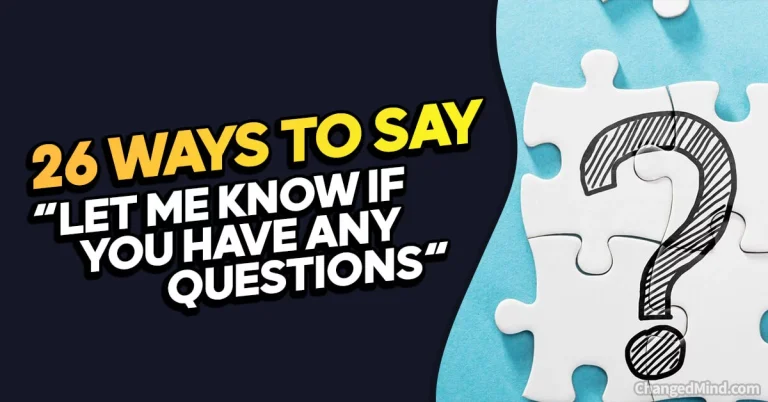Love is a language of its own, and sometimes decoding its expressions can be as puzzling as deciphering hieroglyphics. But fear not, dear reader, for we have embarked on a mission to unravel the secrets behind “Much Love.”
In this captivating article, we’ll explore the sixteen different meanings that lie beneath this seemingly simple phrase. From the heartwarming to the humorous, we’ll delve into the nuances and hidden intentions behind these words of affection.
So, if you’ve ever wondered what someone truly means when they say “much love,” get ready for a delightful journey of understanding, anecdotes, and a few surprises along the way.
Short Answer: Curious about the real meaning behind “much love”? You’re in for a treat! This article uncovers sixteen intriguing interpretations of this popular phrase, shedding light on its diverse range of emotions and intentions.
Key Points to be Discussed:
- The origin and evolution of the phrase “much love.”
- Understanding the different layers of affection conveyed by “much love.”
- Humorous anecdotes and relatable situations where “much love” takes on unexpected meanings.
- Cultural and contextual variations in the usage of “much love.”
- Decoding the hidden messages behind “much love” in relationships, friendships, and beyond.
- Tips for interpreting and responding to “much love” in various situations.
Expressing love and care through words is a powerful way to connect with others and foster meaningful relationships. One such phrase that conveys affection is “Much Love.” Understanding the meaning and appropriate usage of this phrase can help you effectively express your emotions.
Expressions and variations of “Much Love” include phrases like “Lots of Love,” “Sending You Love,” “With All My Love,” “Love and Hugs,” and “Love Always.” Each variation carries its own nuances, providing different shades of affection and warmth in your message.

“Much Love” is especially suitable for casual relationships, where it serves as a friendly and warm way to sign off. It is also commonly used with family and close friends, emphasizing the deep affection and closeness shared. However, “Much Love” may not be suitable for professional situations, as it may be too informal or personal.
While “Much Love” is a lovely expression, there are alternatives that can be used in different contexts. These include phrases like “Best Wishes,” “Warm Regards,” “Take Care,” and “Thinking of You.” These alternatives can be used when you want to convey sincerity and care without the level of intimacy associated with “Much Love.”
When using any of these expressions, it’s important to consider the recipient and the nature of your relationship. Tailoring your message to the specific situation and individual will ensure that your love and care come across as genuine and heartfelt.
Key takeaway:
- Understanding the meaning of “Much Love”: “Much Love” is an expression of deep affection and care towards someone.
- Expressions and variations of “Much Love”: Variations like “Lots of Love,” “Sending You Love,” “With All My Love,” “Love and Hugs,” and “Love Always” convey sincere emotions.
- When to use “Much Love”: It is suitable for casual relationships, family and close friends, and even some professional situations, depending on the level of familiarity.
Understanding the Meaning of “Much Love”

The phrase “much love” holds significant meaning in various contexts, from casual conversations to social media interactions. It signifies affection, care, well-wishing, support, and encouragement. When someone says “much love,” they are expressing genuine emotions and conveying heartfelt feelings towards the recipient.
It is a way to send positive vibes, happiness, and goodwill, wishing the person success in all their endeavors. The phrase originated in African American communities as a means of showing solidarity and love amidst adversity. Over time, “much love” expanded beyond racial boundaries and became a common expression of affection and positivity among friends, family, and even strangers.
Today, it is an integral part of popular culture, frequently used in social media as a sign-off. Understanding the true meaning of “much love” allows us to fully appreciate the depth of emotions and genuine care it represents. So, next time you come across this phrase, remember its significance as a heartfelt expression of love and care.
Expressions and Variations of “Much Love”
Love is a universal language that is expressed in numerous ways. In this section, we will explore the various expressions and variations of “Much Love.”
From “Lots of Love” to “Sending You Love” and “With All My Love,” each sub-section will unravel the unique nuances and heartfelt sentiments behind these affectionate phrases. Brace yourself for a journey into the world of love and discover the different ways we can convey our deepest emotions to those we cherish.
“Lots of Love”
When it comes to expressing love and care in messages, one common phrase that is often used is “lots of love.” Here are some key things to consider when using this phrase:
- Authenticity: It is important to genuinely mean the expression of “lots of love” when using it in your messages. This phrase conveys a strong affectionate sentiment, so make sure it aligns with your true emotions.
- Intimacy: “Lots of love” is often used in close relationships and with people you have a deep connection with. It is more personal and may not be suitable for casual acquaintances or professional settings.
- Positive Connotation: The phrase “lots of love” carries a positive connotation, indicating warmth, affection, and care. It can boost the recipient’s well-being and strengthen your relationship.
- Versatility: While “lots of love” is a popular expression, there are alternative ways to convey similar sentiments, such as “sending you love,” “with all my love,” “love and hugs,” or “love always.” Choose the phrase that best suits the context and your relationship with the recipient.
Throughout history, the use of expressions to convey love has been prevalent. From ancient writings of poets and philosophers to modern-day communication, expressing love and affection has always been an essential part of human interaction. The phrase “lots of love” is just one example of how people have developed language and expressions to convey their deep emotions. By choosing the right words and using them sincerely, we can continue to cultivate strong and meaningful connections with our loved ones.
When you can’t be there in person, sending you love is the next best option.
“Sending You Love”
Sending love to someone is a heartfelt gesture that conveys care and affection. It is important to understand the meaning behind “sending you love” and when it is appropriate to use this expression.
1. Expressing Love and Support: When sending someone love, it is a way to express affection, support, and goodwill towards them. This phrase conveys warmth and a genuine desire for the recipient to feel loved and cared for.
2. Close Relationships: “Sending you love” is commonly used in close relationships such as family and close friends. It is a way to show that you are thinking of them and want them to feel loved, especially during challenging times or moments of celebration.
3. Romantic Relationships: Couples often use this expression as a way to express their love and affection towards each other. It can be used in messages, letters, or even as a farewell gesture, reinforcing the emotional connection between partners.
4. Compassion and Empathy: “Sending you love” can also be used to show compassion and empathy towards someone who may be going through a difficult time. By expressing care and support, it lets them know that they are not alone and that they are in your thoughts.
5. Sincerity: When using this expression, it is important to do so sincerely and genuinely. Make sure that the message you are conveying is authentic and comes from the heart, as insincere expressions of love can be perceived as superficial.
Give them ‘all my love’ and a restraining order.
“With All My Love”
When it comes to expressing deep affection and care in messages, using the phrase “With All My Love” can truly convey your heartfelt emotions. This expression holds a powerful sentiment and signifies the depth of your affection towards the recipient.
- Authenticity: When using “With All My Love,” it is crucial to genuinely mean it. This phrase should only be used when you truly have deep feelings of love and care towards the person.
- Close relationships: “With All My Love” is most commonly used in personal relationships, such as expressing your love for a partner, spouse, or family member. It is a way to emphasize the strength and intensity of your feelings.
- Special occasions: This phrase is particularly fitting for special occasions like birthdays, anniversaries, or Valentine’s Day. It adds an extra touch of sincerity and love to your heartfelt wishes or messages.
- Intimate moments: “With All My Love” can also be used in more intimate moments between partners, emphasizing the depth of your affection and desire.
- Modify according to context: Depending on the relationship dynamics and the level of formality, you can modify the phrase to suit the occasion. For instance, you can use “With All My Love, [Name]” or “With All My Love and Affection” to tailor the message.
Remember, the phrase “With All My Love” should be used with utmost sincerity and care. It signifies a deep connection and should only be used when your emotions truly align with the sentiment. It adds a personal touch and allows the recipient to feel the depth of your emotions.
So, when you want to express your genuine love and care, don’t hesitate to use “With All My Love.” It is a powerful and beautiful way to convey your heartfelt emotions.
Give ’em the perfect combo: love and hugs, because who doesn’t love a warm embrace and some emotional support in one go?
“Love and Hugs”
Love and hugs are expressions of affection and care that can be conveyed through messages or in person. They provide a warm and comforting feeling to the recipient, creating a sense of connection and support. When using the phrase “love and hugs,” it signifies the deep emotions of love combined with the physical gesture of a hug.
Here are some instances when “love and hugs” can be used:
- In close relationships: “Love and hugs” can be used to express love and support to family members, close friends, or romantic partners. It conveys a deep level of affection and a desire to comfort the person.
- In times of need or sadness: “Love and hugs” can be used to offer solace and emotional support when someone is going through a difficult time. It shows empathy and a willingness to be there for them.
- Celebratory moments: “Love and hugs” can be used to celebrate achievements, milestones, or special occasions with loved ones. It denotes joy and a shared sense of happiness.
- Long-distance relationships: When distance separates individuals, “love and hugs” can be used to bridge the physical gap and remind the person that they are loved and missed. It offers a virtual embrace.
By using the phrase “love and hugs,” you can enhance the emotional connection and express genuine care towards the recipient. It adds warmth and sincerity to your message or interaction.
I remember when my best friend was going through a tough time after losing a loved one. I wanted to show my support and let her know that I was there for her. I sent her a heartfelt message saying, “Sending you all my love and hugs during this difficult time.

Know that I am here for you, supporting you every step of the way.” Those simple words brought her comfort, and she expressed how much it meant to know that someone cared and understood her pain. It reminded me of the power of love and hugs, even from afar.
Love Always: When you want your love to last longer than your ex’s grudges.
“Love Always”
When it comes to expressing affection and care in messages, the phrase “Love Always” is a powerful and meaningful choice. Here are some reasons to consider incorporating “Love Always” into your communications:
- Unconditional love: “Love Always” signifies a deep and unwavering love. It conveys a sense of permanence and assurance in your affection towards the recipient.
- Closeness and connection: By using “Love Always,” you establish a strong bond with the person you are addressing. It shows that your love extends beyond temporary circumstances and is present in all aspects of your relationship.
- Enduring support: “Love Always” implies a commitment to standing by someone’s side through thick and thin. It assures them that you will always be there to offer love, support, and understanding.
- Emotional warmth: This phrase evokes a sense of warmth and tenderness. It conveys a genuine affection that can bring comfort and reassurance to the recipient.
- Familiarity and intimacy: “Love Always” is often used in close relationships, such as family or romantic partnerships. It creates a sense of familiarity and intimacy, emphasizing the depth of your connection.
When using “Love Always,” it is important to consider the nature of your relationship and the context in which you are communicating. Here are some situations where “Love Always” is particularly appropriate:
- Familial relationships: “Love Always” is a heartfelt way to express your enduring love for family members, showing that your affection knows no bounds.
- Close friendships: If you have a deep and meaningful friendship, “Love Always” can be a sincere way to express your unwavering support and care.
- Romantic partnerships: “Love Always” is often used between romantic partners to convey everlasting love and commitment.
While “Love Always” is a beautiful phrase, it’s important to consider alternatives that may be more suitable for certain situations. Some alternatives include “Best Wishes,” “Warm Regards,” “Take Care,” and “Thinking of You.” These alternatives can still convey warmth and care while being more appropriate for professional or casual relationships.
In your messages, remember to genuinely and sincerely express your love and care. Your words should reflect your true feelings and create a heartfelt connection with the recipient.
What Do You Say When Someone Says Much Love?
- “Thank you! Much love right back at you!”
- “Sending you loads of love and gratitude!”
- “Aww, that means a lot. Love you too!”
- “You always know how to brighten my day. Much love!”
- “Likewise! Wishing you all the love in the world!”
- “You’re an amazing friend. Love and appreciate you!”
- “Feeling the love! Thanks for your kind words.”
- “Sending you virtual hugs and lots of love!”
- “You’ve made my heart smile. Love you!”
- “I’m truly touched. Love and blessings to you!”
- “Your love and support mean everything to me.”
- “I’m grateful to have you in my life. Much love!”
- “You’ve made my day brighter. Sending love your way.”
- “Your words warm my heart. Love you to the moon and back!”
- “You’re a true gem. Wishing you love and happiness.”
- “Your love is contagious. Thank you for being amazing!”
These responses reflect appreciation, reciprocation, and gratitude when someone expresses “much love” towards you. They convey warmth, affection, and a genuine connection, fostering a positive and loving atmosphere in your interactions.
When to Use “Much Love”
If you’ve ever wondered when it’s fitting to drop a “much love,” then this section is for you.
We’ll dive into the different situations where using “much love” is appropriate.
From casual relationships to interactions with family and close friends, as well as professional settings, we’ll explore the nuances and contexts where this heartfelt expression truly shines.
Get ready to learn how to sprinkle some genuine “much love” in your life!
Casual Relationships

When it comes to casual relationships, expressing love and care can be a tricky balance. Here are some things to consider:
1. Keep it light: In casual relationships, it’s best to keep expressions of love casual as well. Avoid using overly romantic or intense phrases like “I love you deeply” or “you mean the world to me.” Instead, opt for more casual and friendly expressions of affection.
2. Use friendly endearments: Using friendly endearments like “buddy,” “pal,” or “friend” can help convey a sense of closeness and warmth without crossing the boundaries of a casual relationship. It creates a friendly and comfortable tone.
3. Show genuine interest: Take the time to ask about their day, their interests, or their thoughts on topics they care about. Showing genuine interest in their life and opinions can help strengthen the bond of a casual relationship without making it too serious.
4. Share lighthearted moments: Send funny or silly memes, jokes, or anecdotes that you know they will appreciate. Sharing lighthearted moments can help create a sense of connection and shared humor.
5. Plan casual hangouts: Instead of going all out on romantic dinners or extravagant dates, plan casual hangouts that reflect the relaxed nature of the relationship. Grabbing a coffee, going for a walk, or watching a movie together can be enjoyable activities that maintain the casual vibe.
6. Respect boundaries: In casual relationships, it’s important to respect each other’s boundaries and not push for more than what both parties are comfortable with. Open communication and clear understanding of expectations can help maintain a healthy and comfortable dynamic.
Remember, casual relationships are built on mutual enjoyment and companionship, so focus on fostering a sense of ease and genuine connection. By keeping things light, friendly, and respectful, you can navigate casual relationships while still expressing care and affection.
Love so strong, it’s practically a family reunion every time you text.
Family and Close Friends
When expressing love and care to family and close friends, it is important to choose the right words and tone. Here are some suggestions:
- Start with “Much love”: Use the phrase “Much love” as a warm and affectionate greeting for your family and close friends.
- Add personal touches: Personalize your messages by including specific details that show you know and care about the recipient. Mention shared memories or inside jokes to make your message more meaningful.
- Express gratitude: Take the opportunity to express gratitude for the love and support your family and close friends have given you. Let them know how much you appreciate their presence in your life.
- Share your feelings: Use words to describe how much you love and cherish your family and close friends. Be genuine and heartfelt in your expressions.
- Be supportive: Show your support and offer words of encouragement during difficult times. Let your loved ones know that you are there for them and that they can rely on your love and support.
- Use positive affirmations: Use affirmations to remind your family and close friends of their worth and importance in your life. Make them feel special and valued.
- End with “Love always”: Sign off your message with the phrase “Love always” to convey a lasting and unconditional love for your family and close friends.
Remember, the key is to be sincere and genuine in your expressions of love and care for your family and close friends. Let them know how much they mean to you and how grateful you are to have them in your life.
In professional situations, ‘much love’ is about as appropriate as a clown at a funeral.
Professional Situations
When it comes to professional situations, it is important to maintain a level of formality and respect. Expressing love and care in messages requires a polite and professional tone. Here are some guidelines to consider:
- Use a polite and professional tone: It is essential to choose your words carefully and ensure that the message is respectful and appropriate for the professional setting.
- Keep it concise: In professional settings where time is limited, it is important to convey your message succinctly. Avoid lengthy expressions of love and keep the message brief and to the point.
- Consider the relationship: The level of closeness and familiarity with the recipient should influence the level of affection expressed in the message. For colleagues or clients, it may be more appropriate to use phrases like “Best regards” or “Warm wishes” instead of expressions of love.
- Adapt to the context: Adjust your language accordingly depending on the specific professional situation. Focus on professionalism and showcase your skills and qualifications when emailing a potential employer or client, rather than expressing love.
- Use appropriate alternative phrases: In professional situations, there are alternative phrases that convey warmth and care without crossing boundaries. Consider using phrases such as “Best wishes,” “Take care,” “Thinking of you,” or “Sincerely.”
Remember, it is essential to maintain professionalism and respect in professional settings. While it is important to show care and kindness, it is equally important to be mindful of appropriate boundaries and use a professional tone.
Alternatives to “Much Love”
Looking for new ways to express affection beyond the overused “Much Love”? Discover a range of heartfelt alternatives in this section. From conveying your heartfelt sentiments with “Best Wishes” to spreading warmth with “Warm Regards,” and from expressing concern with “Take Care” to showing someone they’re on your mind with “Thinking of You.”

Say it differently, but with the same love. No need for repetitive expressions when you have these creative alternatives at your fingertips!
“Best Wishes”
When it comes to conveying your sincere love and care in messages, using the phrase “Best Wishes” can be a thoughtful and meaningful choice. Here are some reasons why “Best Wishes” is a great option:
- Positive and Encouraging: “Best Wishes” brings a positive and uplifting tone to your message. It shows that you genuinely care about the person’s well-being and want the best for them.
- Well-Wishing: By using “Best Wishes,” you are expressing your hope and desire for good things to happen in the person’s life. It conveys a sense of optimism and positivity.
- Versatility: “Best Wishes” is appropriate for various situations and relationships. Whether you are sending a message to a friend, family member, colleague, or acquaintance, it is a versatile phrase that can be used in different contexts.
- Professional Settings: “Best Wishes” is a suitable choice for professional or formal situations where you want to maintain a polite and respectful tone. It conveys professionalism while still expressing your well-wishes.
- Celebratory Occasions: Whether it’s a birthday, anniversary, graduation, or any other milestone, “Best Wishes” is a fitting way to extend your congratulations and express your joy for the person’s achievements or special moments.
When using “Best Wishes” in your messages, remember to personalize and tailor your words to the recipient. Consider their specific situation and relationship with you. Adding a genuine and heartfelt message alongside “Best Wishes” will make your communication even more meaningful.
“Warm Regards”
When it comes to expressing warmth and sincerity in your messages, using the phrase “Warm Regards” can be an excellent choice. Here are some important aspects to consider regarding the sub-topic of
- Professionalism: “Warm Regards” is commonly used in professional situations. It conveys a sense of professionalism and respect while still adding a touch of warmth to your message.
- Formality: It is suitable for more formal relationships, such as with colleagues, clients, or business partners. In these contexts, “Warm Regards” strikes the right balance between friendliness and professionalism.
- Alternative to “Best Wishes”: “Warm Regards” can also be used as an alternative to “Best Wishes” when you want to express your well-wishes in a more personal and heartfelt manner.
- Meaning: By using “Warm Regards,” you are effectively sending a message of goodwill and genuine care. The phrase shows that you hold the recipient in high regard and want them to have a positive experience.
- Flexibility: “Warm Regards” is a versatile phrase that can be used in various contexts, such as in emails, letters, or even in-person conversations. It adds a personal touch that helps create a warm and friendly atmosphere.
Remember that the tone and appropriateness of your message will depend on the specific relationship and situation. Consider the recipient’s preferences and the nature of your connection when deciding whether to use “Warm Regards” or another expression of warmth and sincerity. By choosing the right words, you can convey your genuine care and create a positive impression.
Take care, because the world isn’t all hugs and kisses, sometimes it’s just a slap in the face with reality.
“Take Care”
When sending messages or signing off in emails, it is important to convey sincere love and care. One common phrase used for this purpose is “Take care.” Here are some considerations to keep in mind when using this expression:
- Authenticity: It is essential to genuinely mean the well-wishes conveyed with “Take care.” Failing to do so may come across as insincere or dismissive.
- Situation: “Take care” is a versatile phrase that can be used in various situations. It is appropriate for casual relationships, such as acquaintances or colleagues, where a warm sentiment is desired without being too intimate.
- Concern: When using “Take care” with family and close friends, it expresses genuine care and concern. It shows that you want them to prioritize their well-being and safety.
- Professionalism: In professional situations, “Take care” can be used as a polite way to end a conversation or email. It conveys a sense of mindfulness towards the recipient’s welfare, creating a positive impression.
When using “Take care,” it is important to consider the context and adjust accordingly. Remember, the phrase is meant to convey care and well-wishes. It is not appropriate to use it sarcastically or dismissively.
Pro-tip: To further enhance the sentiment of “Take care,” consider adding a personalized touch. You could mention specific ways the recipient can take care of themselves or reference something significant to them. This shows that you genuinely care about their well-being and goes beyond a generic expression.
Thinking of you – because nothing says I care like randomly popping into someone’s mind and staying rent-free.
“Thinking of You”
When you want to convey your love and care to someone, the phrase “thinking of you” is a heartfelt way to express your sentiments.
Here are some key points to consider when using the phrase “thinking of you“:
- Authenticity: It is important to genuinely mean what you say when telling someone that you are thinking of them. Make sure your message comes from the heart and reflects your true feelings.
- Frequency: Use the phrase “thinking of you” sparingly to maintain its impact. Save it for special occasions or moments when you truly want to let someone know that they are on your mind.
- Specificity: Be specific in your message to show the person that you are truly thinking of them. You can mention a specific memory, conversation, or moment that you shared together to create a more personal connection.
- Medium: Choose the appropriate medium to convey your message. You can send a heartfelt text message, write a handwritten note, or even make a phone call to let someone know that they are in your thoughts.
- Timing: Consider the timing of your message. Sending a “thinking of you” message during a difficult time or when someone is going through a challenging situation can provide great comfort and support.
- Relevance: Make sure your “thinking of you” message is relevant to the person you are sending it to. Tailor your message to suit their interests, hobbies, or current circumstances to show that you truly understand and care about them.
Remember, the phrase “thinking of you” holds great meaning and can bring joy and comfort to someone’s day. Use it with sincerity and thoughtfulness to make a meaningful connection.
Tips for Conveying Sincere Love and Care in Messages
When it comes to conveying sincere love and care in messages, here are some helpful tips:
- Be specific: Instead of using generic statements, be specific about why you care for the person. Mention specific qualities or actions that make them special.
- Show empathy: Displaying empathy and understanding in your messages can make the recipient feel heard and loved. Acknowledge their feelings and be supportive.
- Use personal references: Reference shared memories or inside jokes to make your message more meaningful and personal. It shows that you truly know the person and value their presence in your life.
- Show appreciation: Express your gratitude and appreciation for the person. Acknowledge the positive things they bring to your life and how they make a difference.
- Be genuine: Authenticity is key in conveying sincere love and care. Speak from the heart and let your true feelings show through your words. Avoid using clichés or empty expressions.
A true story that exemplifies these tips is the story of Jean and Marie. Jean, a busy executive, used to send Marie quick, generic messages to show his love and care.
However, after realizing the importance of sincere communication, he decided to change his approach. He started writing heartfelt messages, expressing his appreciation for Marie’s support and understanding. He would reference special moments they shared and express his genuine love for her.
These messages made Marie feel truly loved and valued. Their relationship grew stronger as they cultivated open and heartfelt communication through their messages. It was a reminder that sincere love and care can be conveyed through simple messages when they come from the heart.
Some Facts About “Much Love” Meanings in English Language:
- ✅ “Much love” can be used as a sign of affection between male friends. (Source: Urban Dictionary)
- ✅ The phrase “much love” can express a significant amount of love towards someone. (Source: Strategies for Parents)
- ✅ It is important to use “much love” appropriately and in the right context to convey significant affection, respect, and admiration. (Source: ChangedMind.com)
- ✅ Different replies can be given when someone says “much love” depending on the relationship and intention behind the phrase. (Source: ChangedMind.com)
- ✅ Alternative phrases can be used to express love and appreciation, such as “love you,” “lots of love,” and “hugs and kisses.” (Source: ChangedMind.com)
Frequently Asked Questions
What are some possible meanings of “much love”?
Some possible meanings of “much love” include expressing love and appreciation towards family and close friends, showing admiration and respect towards someone, expressing casual affection in a romantic context, and using it as a casual remark to show appreciation for the time spent together with acquaintances.
Is “much love” appropriate in business or school-related correspondence?
No, it is not appropriate to use “much love” in business or school-related correspondence. It is best to reserve this phrase for people and things we are familiar with, such as close friends and family.
What are some alternative phrases to express love and appreciation instead of “much love”?
Some alternative phrases to express love and appreciation include “love you,” “lots of love,” “all the X’s and O’s,” “hugs and kisses,” “all of my love to you,” and “I cherish you.” It is important to choose the appropriate phrase based on the relationship and the intention behind the expression of affection.
When someone says “much love,” how should I reply?
The appropriate reply to someone saying “much love” depends on the relationship and the intention behind the phrase. Some possible replies include “much more love,” “love you more,” “same here,” “much love to you,” “I can always count on you,” “you too,” “thanks for your support,” “see you soon,” and “aww thank you.”
Can “much love” be used as a sign of affection between male friends?
Yes, “much love” can be used as a sign of affection between male friends. It is a phrase commonly used among friends to show respect and affection, without insecurities about their sexuality.
Should I sign off my emails with “much love” if I feel unsure about its meaning?
If you feel unsure about the meaning of “much love” and its appropriateness in your relationship with the recipient, it is best to choose a different sign-off phrase that you are comfortable with. You can use phrases like “with love,” “lots of love,” or “sending my love” as alternatives.







